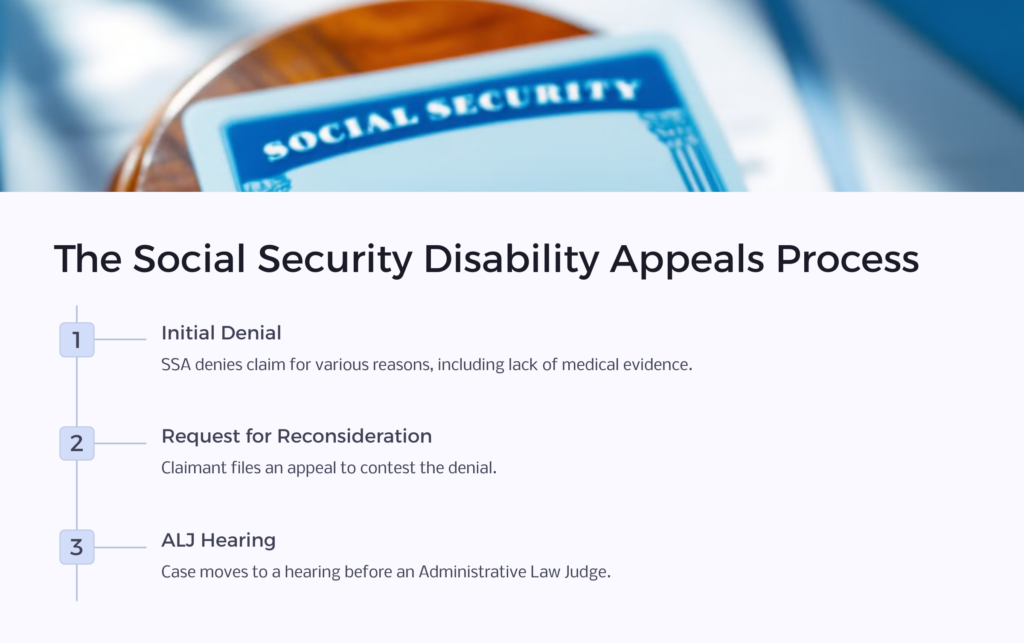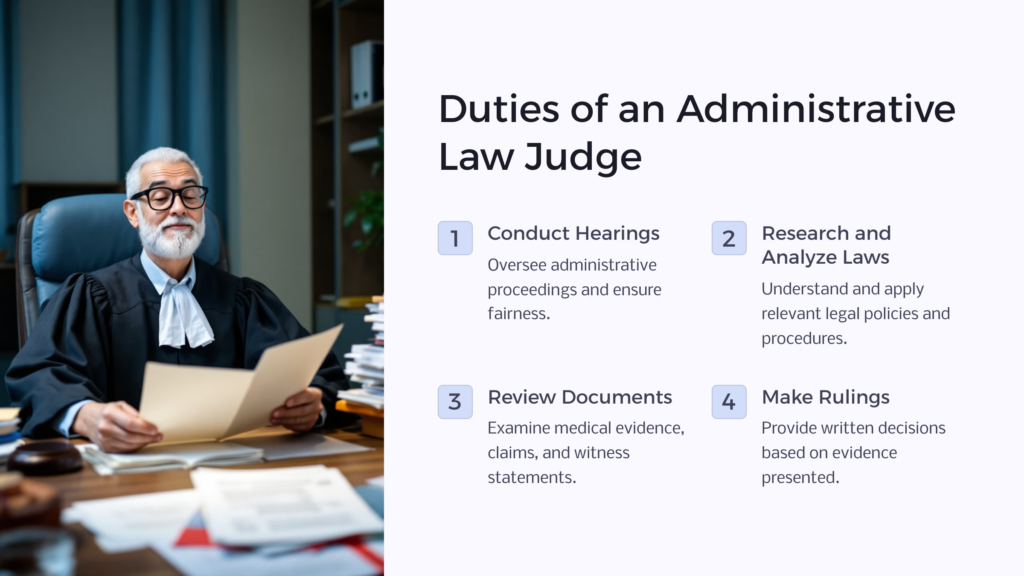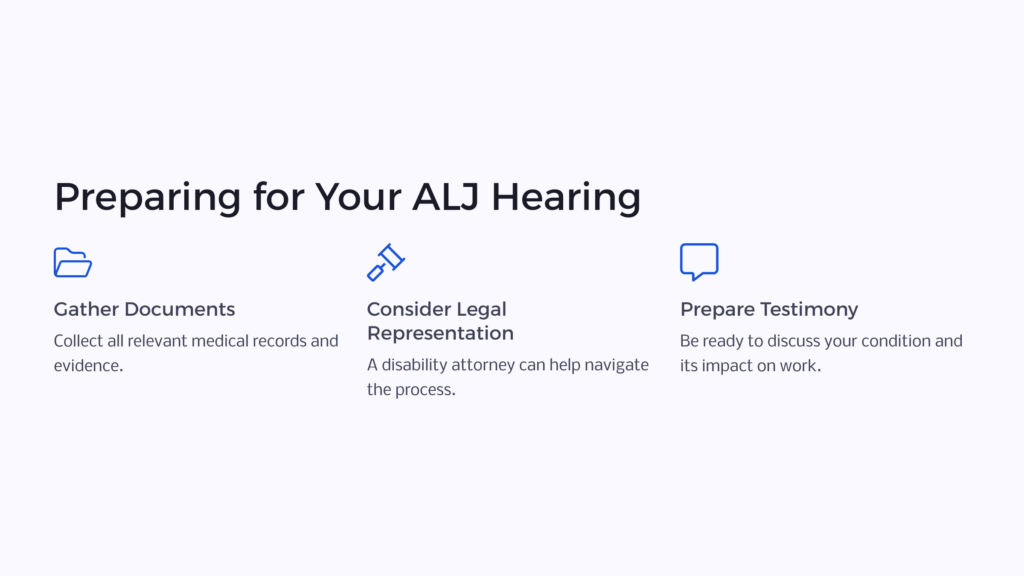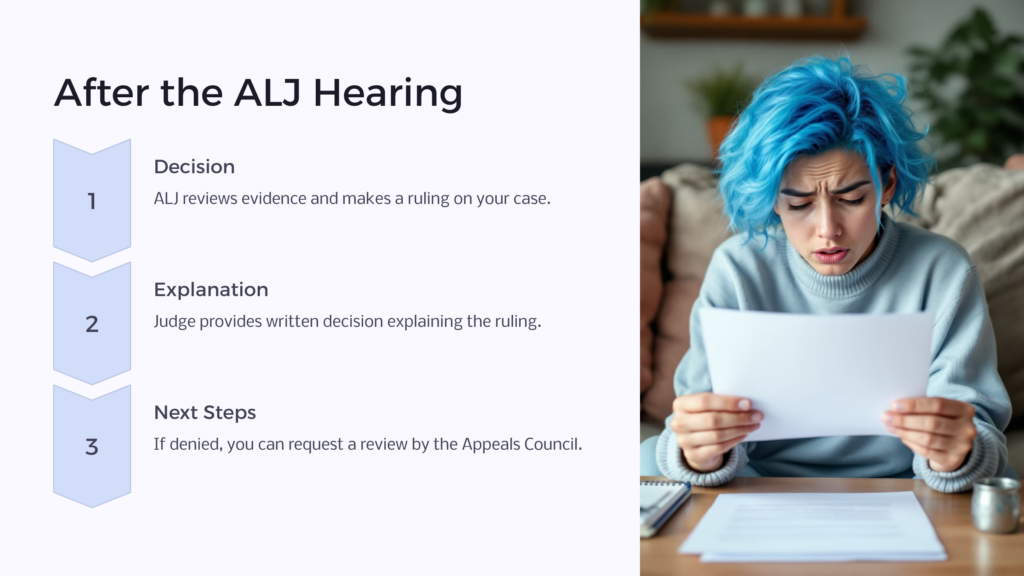There are many cases in which the Social Security Administration (SSA) could deny your disability benefits claim. When this happens, you have a legal right to appeal the decision for a potential reversal of the denial. Your claim will move forward with a hearing before an Administrative Law Judge, who is an impartial party that reviews your case.

7 Duties of an Administrative Law Judge
- Conduct Hearings
- Research and Analyze Laws
- Review and Analyze Documents
- Administer Oaths
- Rule on Evidence
- Grant Settlements
- Explain Rulings and the Appeals Process
The SSA may deny Social Security disability for numerous reasons, including not providing enough medical evidence to support the claim, missing a deadline, or not completing all required forms. Sometimes, the SSA denies claims for a reason that may not be fair, in your opinion.
By law, you can appeal the SSA’s decision. The appeals process involves several steps, but one of those steps will be participating in a hearing with an Administrative Law Judge. These hearings are formal hearings during which you can present more evidence, witnesses, and information to help prove your case.
What Is an Administrative Law Judge?

An Administrative Law Judge (ALJ), also known as a hearing officer, presides over the hearings for various types of administrative proceedings. The ALJ acts as an unbiased third party to an administrative hearing to ensure that all laws, policies, and procedures are followed correctly. They also listen to administrative disputes, government agency decisions, Medicare hearings, and other relevant appeals.
One of the most common administrative hearing types that Administrative Law Judges conduct is the SSA disability appeals hearing. These hearings happen when a disability claimant wants to contest the SSA’s decision on their disability claim. You can have a contested case when you wish to appeal a denial based on a lack of medical evidence, for example.
The Social Security Administration can employ the ALJ for hearings, but the ALJ still needs to remain unbiased. They also do not work for or with you. The ALJ’s primary responsibility is to listen to any evidence or information a disability applicant can provide to prove their side of the case. Based on the information presented during the hearing, the ALJ will rule on the case and make a decision that could reverse the initial decision from the involved agency.
If you’ve received a denial for SSDI or SSI benefits, you can request an appeal through the SSA. The appeal will move forward to a hearing for adjudication with an ALJ. You can start the process by filing a Request for Reconsideration.
When and Where is a Social Security Disability Hearing Held?
Hearings are usually held in person within seventy-five miles of your home. However, if you agree, your hearing might be held by video conferencing. Due to the large number of hearings filed, you will likely have to wait over a year for your hearing. When your hearing date comes up, the Office of Disability Adjudication and Review, which is the Social Security hearing office, will send you notification of the hearing date twenty days in advance.
How a Disability Hearing Is Different from a Reconsideration
Hearings differ from reconsideration reviews in one very important way: you get to talk to, see, and be seen by, the decision maker. This is your chance to give voice to your claim. At a hearing, an Administrative Law Judge literally hears your case. You and your attorney can not only tell the judge about your limitations but, with some illnesses, the judge can also see your limitations. Additionally, you or your attorney can submit depositions, call and question witnesses, such as your doctors, your most recent employer, and your family and friends who have direct knowledge of your limitations. You or your attorney can also cross-examine witnesses that the judge may call, such as any vocational and medical experts.
What Does an Administrative Law Judge Do?
An Administrative Law Judge has several important responsibilities that go along with an administrative hearing. An ALJ must:
1. Conduct Hearings
One of the ALJ’s most obvious duties is to conduct hearings that fall within an administrative jurisdiction. The ALJ hears the evidence, witness statements, and other pertinent information, monitors the hearing’s activities, provides written decisions regarding the case, and explains any rulings to the court. It’s the ALJ’s responsibility to make sure the hearing runs smoothly and fairly for all parties involved.
2. Research and Analyze Laws
The Administrative Procedure Act sets laws and policies in place regarding how federal agencies make decisions. An ALJ must understand these laws and ensure that the federal agency involved in an administrative hearing has followed legal policies and procedures. An ALJ can also research and analyze laws relating to the case to help them prepare for the hearing and make an informed decision.

3. Review and Analyze Documents
An Administrative Law Judge reviews any administrative hearing documents, including medical evidence, claims or applications, witness statements, denial letters, and appeals. An ALJ is not a medical professional, but they still know how to review and analyze documents relating to a Social Security disability case. The ALJ will also look over your identifying documents, like your birth certificate, to validate your identity.
4. Administer Oaths
An oath is a legally bound statement made by people involved in a court case or hearing that verifies that they’re being truthful about the documents they present and statements they make. An Administrative Law Judge administers an oath to all individuals in the administrative hearing to ensure their awareness that they’re locked into legal statements and actions throughout the hearing.
5. Rule on Evidence
An ALJ makes an informed decision about your administrative hearing based on the evidence, statements, and documents you provide. Much of the decision relies on how much relevant evidence you can provide to prove your case and how that evidence holds up according to legal policies and procedures set by the Administrative Procedure Act. The ALJ will have a written ruling and a verbal ruling that they present at the hearing’s end.
6. Grant Settlements
Some cases involve settlements in which one party asks for a sum of money to which they believe they’re entitled. An ALJ will rule on these cases, too, approving or denying the settlement or granting a stay on the case when necessary. The ALJ can also change the amount requested in the settlement if it doesn’t believe the request is fair to one or both parties.
7. Explain Rulings and the Appeals Process
Rulings can be confusing to a party in an administrative case. A disability attorney can help you understand the ruling resulting from your hearing. If you’re representing yourself, the ALJ can also explain rulings to you upon request. The ALJ will also explain your right to appeal if you disagree with their decision and what the appeals process entails.
How to Become an Administrative Law Judge
An Administrative Law Judge is a government employee. The position first began as part of the Administrative Procedure Act that sets rules and policies in place for fair federal agency hearings. The U.S. Office of Personnel Management (OPM) is the overseeing agency of this type of position and its requirements.
Generally, an Administrative Law Judge must have a license to practice law within the United States or one of its territories. They also need at least seven qualifying years of experience as an attorney who has worked with the court to prepare for and participate in hearings and trials. Qualifying hearings and trials include appeals, plea negotiations, and mediations, to name a few.
Finally, an applicant must pass the OPM examination for the position. The exam reviews applicant qualifications and tests the applicant on skills they need to become an Administrative Law Judge. A potential ALJ must pass online, in-person, and proctored assessments as part of the exam.
If the applicant meets all criteria, OPM will place them on a register of qualified candidates to consider when ALJ jobs become available.
With enough time in an ALJ position, you could qualify for a Chief Administrative Law Judge position. The Chief ALJ oversees several other ALJs, usually within a specific region, and creates policies for other ALJs to follow.
Do I Need an Attorney at My Hearing?
 Although you’re not required to have an attorney for your ALJ hearing, a Social Security disability attorney could make the process go more smoothly. An attorney knows how these proceedings work and may be able to predict the ALJ’s decision based on the information you currently have for your case. If the ALJ decision may not be favorable for you, your attorney will provide legal advice, help you gather medical evidence, and counsel you about the process.
Although you’re not required to have an attorney for your ALJ hearing, a Social Security disability attorney could make the process go more smoothly. An attorney knows how these proceedings work and may be able to predict the ALJ’s decision based on the information you currently have for your case. If the ALJ decision may not be favorable for you, your attorney will provide legal advice, help you gather medical evidence, and counsel you about the process.
Before your case hearing, an attorney can be incredibly helpful in explaining what happens during the hearing, what responsibilities you have, and how the ALJ works as an adjudicator for the hearing. Your attorney can also help you prepare your ALJ application for a hearing and prepare documents that could help you win your appeal.
During the court hearing, your disability attorney represents you. Just like in a regular trial, your attorney can call you as a witness to explain more about your case or condition, present more medical evidence to the ALJ, and help you navigate the hearing process. You can depend on a disability attorney to explain anything you don’t understand, including precedent decisions or questions the ALJ asks.
Another benefit of having an attorney is that you may not have to attend an actual hearing. Instead, depending on the facts of your claim, your attorney may request an “on-the-record” decision. This means that the lawyer writes up a summary of the information in your claim file and makes a written argument for your approval. The Administrative Law Judge then reviews the on-the-record request and, if he can approve your claim, he will go ahead with a decision. If that happens, you don’t have to go to court! If the judge does not approve your claim on the record, you will still get your hearing.
How to Talk to an Administrative Law Judge
Regardless of whether you choose to have an attorney represent you during your hearing, the Administrative Law Judge will probably have some questions for you to answer. This can seem intimidating, but remember that the ALJ needs to have as much information as possible to determine a fair outcome for your case.
Before your hearing, come prepared to answer questions. You might go over some information in your head, like tests you’ve had for your condition and approximate dates for any diagnoses. Doing so may help you jog your memory if the judge has specific questions about your medical history.
It’s common for the ALJ to ask about your condition and the symptoms you experience. After hearing a question, take a moment to gather your response rather than answering immediately. If the judge asks how frequently and severely you experience a specific symptom, you need to answer honestly. One of the judge’s key considerations is deciding whether you appear to be exaggerating your condition.
Try to use specific terms, when possible. For instance, if the judge asks you to explain how severe and frequent your back pain is, you might answer, “I experience crippling back pain for three or four days per week, on average. It keeps me in bed most of the day on those days because medication doesn’t relieve it.” Responding with generic words like, “bad” or “sometimes,” won’t give the judge enough information about how your symptoms affect your daily life.
Connect your symptoms to your inability to work, when possible. Explaining how your back pain prevents you from standing or sitting to perform a job reliably allows the judge to understand why it’s challenging for you to continue working.
Also, be sure to ask for clarifications or repeats of questions you don’t understand. Your attorney, if you have one, can help you understand questions. If you’re representing yourself, simply ask the judge to rephrase the question.

What If the ALJ Denies My Disability Claim?
If your claim is denied at the Social Security Disability hearing, you can request a review of the denial by the Appeals Council.
Understanding the Role of the Administrative Law Judge
An administrative hearing might be a necessary part of the Social Security disability process if you choose to appeal the SSA’s decision on your disability claim. Although an appeal hearing can seem intimidating, trust that the ALJ is an unbiased party that reviews evidence and documents to provide a fair decision.
Before your hearing, gather documents, speak with your physician to get your full medical history, and consider working with a disability attorney to help you navigate the process. The more prepared you are before your hearing, the more at ease you’ll feel in front of the Administrative Law Judge.
 Benefits.com Advisors
Benefits.com Advisors
With expertise spanning local, state, and federal benefit programs, our team is dedicated to guiding individuals towards the perfect program tailored to their unique circumstances.
Rise to the top with Peak Benefits!
Join our Peak Benefits Newsletter for the latest news, resources, and offers on all things government benefits.



















